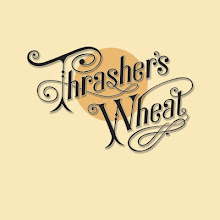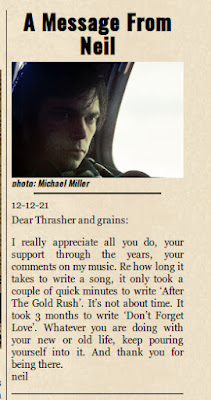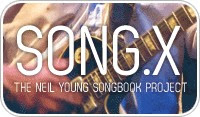Archives Comment of the Moment: Neil Encounters

The Neil Young Archives Comment of the Moment is from Commentary Open Thread by Pinto (or Flounder):
Writing about the Archives is really difficult, because the scope is so large and leads to so many trains of thought. But a few off the cuff observations after a month of Neil-immersion, from the Archives back to the bootlegs and some of the albums I spent less time with, and a re-reading of Shakey and Love to Burn:
-When the archives songs were recorded, Neil Young was not NEIL YOUNG. He was a very young man who, in a short period of time, had connected, in his Canadian years, with a group as diverse as John Kay (and the pre-Steppenwolf Sparrow),Joni Mitchell, Randy Bachman, and Rick James (which still kills me.) He was a folk-singer, an electric guitarist, and, with Rick James, a Motown artist - all before he hit the States.
Hooking up with Stills and Furay, he went through the insanity of Buffalo Springfield, epilepsy, beating by cops, all while working illegally in a "foreign" country, etc.
The point being that, regardless of his ego or his belief in himself, he had no idea that he was going to end up being NEIL YOUNG. Nor did we as we encountered his early recordings.
-we, most of us, did not encounter Neil in the neatly organized chronology of the Archives. I first heard him on "Buffalo Springfield" which I bought because of "For What it's Worth" without any knowledge of Neil Young and was surprised to find that he wrote better songs than Stills.
My next encounter was, in my senior year of high school, with "Everybody Knows.." which was, and is, one of the most unusual albums ever recorded, in the sense that there was no precedent for a "folk singer" to also be a highly original electric guitarist. You couldn't, and can't, talk about Neil Young in the same context as his contemporary singer/songwriters.
Sure Dylan can play guitar, as could Paul Simon, but neither of them ever recorded a song with a 10 minute guitar solo, much less one that they played. (And I am firmly in the camp that believes that Neil is a spectacularly talented guitarist.) Stills and John Fogerty come to mind as well, but Stills never wrote melodies or lyrics that stand with Neil's best and he drugged himself out pretty quickly. (Nor was he a particularly original guitarist, technical prowess aside.) Fogerty deserves to be in the discussion, but his body of work does not compare with Neil's after 40 years. As writers/singers/instrumentalists Neil's only analog is maybe Prince (which leads back to ironic thoughts about Neil's association with Rick James.)
-as Neil followed "Everybody Knows.." with "Goldrush", CSNY, and "Harvest" he was reinventing himself every six months, yet, as the Archives Volume One ends, no one could possibly have predicted what was to follow. I vividly remember rushing to the store to buy "Time Fades Away" and bringing it to a college party without having listened to it first. I would give a lot to be able to recapture the looks on people's faces as it blasted out of the stereo.
-listening to the early songs, reading Shakey, for better or worse, there is no evidence that Neil has ever read a book. As he says in Shakey, talking about why he quit singing "Tell Me Why" (because he realized that the chorus makes no sense) he says "I never edit myself."
Good (and sometimes bad) for him. Unfiltered through literary pretensions we end up with stunning images, remarkable poetry, and, once in awhile, some truly horrible lines. (But to his everlasting credit, Neil is completely aware of this, and doesn't give a shit. He describes Last Trip to Tulsa as a comedy song. I had a bootleg, many years ago, where he stops in the middle of Sugar Mountain and talks about how he wrote something like 139 verses and "This is the worst one" and then sings the "I was underneath the stairs.." verse.)
- I am so grateful for the Archives and the opportunity to go back to the beginning and watch and hear him create the greatest body of work of my lifetime. Revisiting the bootlegs, I have no doubt that the next volumes will be even better.
Thanks Pinto (or Flounder)!
More commentary and thoughts on Neil Young Archives and our review here.































 Human Highway
Human Highway

















 Concert Review of the Moment
Concert Review of the Moment





 This Land is My Land
This Land is My Land

 FREEDOM In A New Year
FREEDOM In A New Year









 *Thanks Neil!*
*Thanks Neil!*




![[EFC Blue Ribbon - Free Speech Online]](http://www.thrasherswheat.org/gifs/free-speech.gif)











 The Unbearable Lightness of Being Neil Young
The Unbearable Lightness of Being Neil Young Pardon My Heart
Pardon My Heart



 "We're The Ones
"We're The Ones  Thanks for Supporting Thrasher's Wheat!
Thanks for Supporting Thrasher's Wheat!




 This blog
This blog 
 (... he didn't kill himself either...)
#AaronDidntKillHimself
(... he didn't kill himself either...)
#AaronDidntKillHimself









































































 Neil Young's Moon Songs
Neil Young's Moon Songs




 Civic Duty Is Not Terrorism
Civic Duty Is Not Terrorism Orwell (and Grandpa) Was Right
Orwell (and Grandpa) Was Right


 What's So Funny About
What's So Funny About 



7 Comments:
Great thoughts and well put together Pinto.
I discovered Neil, when After the Goldrush came out and worked backwards from their.
I was introduced to Buffalo Springfield by an older friend.
For me the Archives have revealed how good Neil was back in Winnipeg.
I admire his dedication, his maturity, his determination and talent at such a young age.
Interesting point of view. Just one correction on the thought that Prince is the only one to stand up next to Neil being a songwriter AND instrumentalist: Richard Thompson is imho a strong competitor here, a hell of a guitarist with much more 'technique' but the same intensity in emotions as Neil does. Listen to his soloing on 'You can't win' or 'Calvary Cross' just to get the idea.
He also knows his way around the acoustic fairly well.
Peter Dees (Holland)
136 verses, Pinto, not 139 ! At lesat that's what Neil says in that hilarious version of Sugar Mountain from the University of Boulder, Colorado, on Jan 27th, 1971 - there was a vinyl bootleg called "Boulder Colorado" ( or Rocky Mountain Review ) and it's the first ever Neil Young Bootleg I ever saw, touchged and listened to, lent by a University pal in the late 70's . Incomplete show, of course, but a great memory - that acoustic version of Ohio blew me away .
Pinto, like you, I first heard "For What It's Worth" when I was only around 13yo not knowing who NY really was until he teamed up with CSNY..I was into "Marakesh" at the time and started to wonder about the Y bit, later on when I was into "Woodstock".
Nearly the best thing about the Archives is it's history. Wow there is nothing that this man has not had a go at doing and the Archives really puts all of his different genres into one neat package and so far ,we’ve only got the first few years of his career. Up until now and listening to the many albums I have of Neil, I have only observed that it was Neil singing and no matter what he sang, I seemed to like it, could relate to, could sing along too and generally look forward to what NY was gunna come up with next.
Everyone so far on reviewing the Archives has mentioned the technology, the sound, the vast amount of songs, his guitar style and technique.. but.. little has been said about the feelings that the Archives evokes. Since I have received the Archives and watched it, replayed it, had fun with it, cursed it, marvelled at its technology and appreciated it etc I have also never laughed so hard in my life (audience expectations interview), I have cried like a baby and cursed Neil for making himself more vulnerable than ever to the public and for letting the audience see a glimpse of his soul and for that alone, I feel very privileged to own Archives 1.
Remember this is a man whom is suppose to not give a shit about the rest of the world and how it thinks about him...but here in the Archives is living proof of a man, whom has been vulnerable to life, its catastrophic experiences which have shaped his life and sometimes veered him into totally different directions and he’s had the audacity to put it into film and let us see him warts and all and then shock and horror he’s even let us have an opinion of it all. This man named Neil Young whom supposedly doesn’t give a F!@#K about what even his fans think of him shows that he really cares and for that alone he will get my undying loyalty and support for whatever he decides to do for the rest of his life.
In my opinion only, the Archives has given us the gift of Neil himself in such an intangible way that I feel beholden to him for giving us nearly too much himself. It’s like the Archives has affected the viewer so personally that I can feel empathy oozing out of my being for this restless soul whom will keeping revealing his beliefs through his music. Sometimes whilst watching the Archives I have this feeling that I’m nothing but a voyeur..lol...because I am getting a disgusting amount of pleasure out of pawing over each disc. Gee I’m not even game to let my friends come and watch it with me ‘caus they’ll think I’m stranger than usual! The Archives has not only taken a lot of time to produce a chronological sequence of events on film but it has also been done with courage and conviction and I therefore believe its Neil's gift to us that we must accept unconditionally as a thank you from him to his fans, friends and family. It’s his autobiography told in a way that no amount of written words could express.
"This man named Neil Young whom supposedly doesn’t give a F!@#K about what even his fans think of him shows that he really cares"
In the midst of a hurricane, even the lillies get watered.
I tell my friends and my kids, my wife, anybody...I don't care about anything, but I'm concerned with everything. Kinda like all roads lead to Rome, as long as you get there. Carnage, sure. Regrets, maybe. When the dinner turns out great I don't don't care how messy the kitchen is.
I think Neil's passion, (and expanding talent) are evident by the results that are shown, the increasing growth in the music, the artistry, use of the technology and the man himself. And it certaiinly shows in the progression.
Great comments and thanks for the repost, Thrasher. I honestly don't remember how many verses Neil said he wrote for "Sugar Mountain." The bootleg I had was a two record set of an acoustic concert. It came in a plain white sleeve with a mimeographed stick-on label titled "Niel" (really). I would give a lot to have it back.
Astrolee - I agree completely about the Archives bringing back the "feel" of the music. It's so easy to get distracted by all the new stuff and we have certainly spent enough verbiage on its evaluation. Getting the Archives, going back to the beginning, hauling out Shakey and Love to Burn and re-reading them along with revisiting the bootlegs has been the best artistic experience I've had since I spent a whole summer listening to the first Stax-Volt singles box.
And re: Richard Thompson - I thought about him, but I have never been able to get into his music (my failing, I'm sure.) There's a lot of bullshit in this type of A versus B analysis, and who really cares, anyway, but I can't resist, especially because I don't think Neil has ever been given a proper evaluation with his instrumental talent included. It's like comparing Willie Mays and Hank Aaron (like I haven't dated myself enough already) and ignoring the fact that Willie was the greatest fielding centerfielder ever. Because fielding stats are harder to measure and, likewise, because instrumental prowess is harder to express in words, it tends to get ignored, but it shouldn't.
One of my former coworkers turned me on to Neil back in 1990.He said I should take a listen to Sugar Mountain.So I took his advice and bought Decade.I was SOO blown away by not only Sugar Mountain but also by DBTR,Cortez and so on.I was hooked.And I've never looked back.Thank you Paul(my coworker).I admit that my fav Neil era like so many of us out there is the '73-'80 time period.I know Neil was going through some personal pain during that time.But some GREAT music came out of it.I and many of us can't wait for NYA vol.2 to come out.
Rancho Relaxo
Post a Comment
<< Home